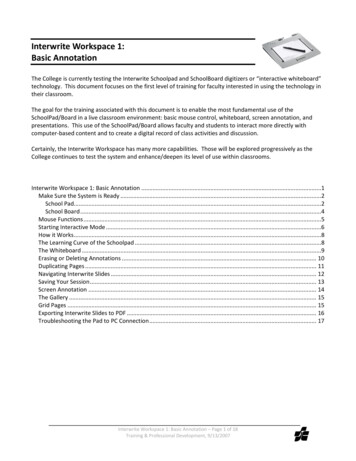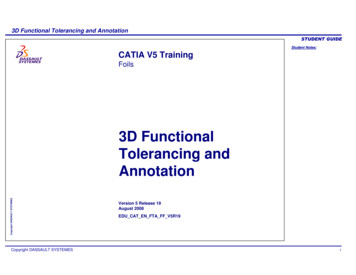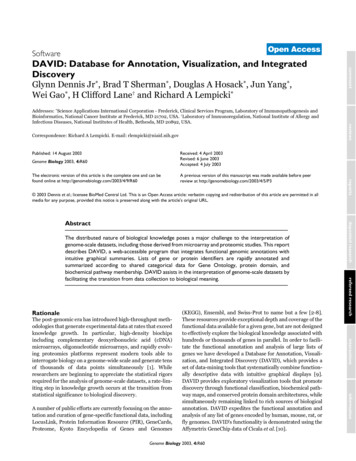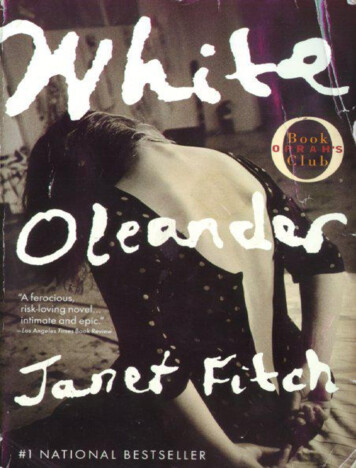
Transcription
AnnotationWhite Oleander is a 1999 novel by American authorJanet Fitch. It is a coming-of-age story about a child(Astrid) who is separated from her mother (Ingrid) andplaced in a series of foster homes. The book was aselection by Oprah’s Book Club in May 1999 and becamea 2002 film.Janet Finch1234567891011121314151617
181920212223242526272829303132
Janet FinchWhite Oleander
1THE SANTA ANAS blew in hot from the desert,shriveling the last of the spring grass into whiskers of palestraw. Only the oleanders thrived, their delicate poisonousblooms, their dagger green leaves. We could not sleep inthe hot dry nights, my mother and I. I woke up at midnight tofind her bed empty. I climbed to the roof and easily spottedher blond hair like a white flame in the light of the threequarter moon.“Oleander time,” she said. “Lovers who kill each othernow will blame it on the wind.” She held up her large handand spread the fingers, let the desert dryness lick through.My mother was not herself in the time of the Santa Anas. Iwas twelve years old and I was afraid for her. I wishedthings were back the way they had been, that Barry was stillhere, that the wind would stop blowing.“You should get some sleep,” I offered.“I never sleep,” she said.I sat next to her, and we stared out at the city thathummed and glittered like a computer chip deep in someunknowable machine, holding its secret like a poker hand.The edge of her white kimono flapped open in the wind andI could see her breast, low and full. Her beauty was like theedge of a very sharp knife.I rested my head on her leg. She smelled like violets.“We are the wands,” she said. “We strive for beauty andbalance, the sensual over the sentimental.”
“The wands,” I repeated. I wanted her to know I waslistening. Our tarot suit, the wands. She used to lay out thecards for me, explain the suits: wands and coins, cups andswords, but she had stopped reading them. She didn’t wantto know the future anymore.“We received our coloring from Norsemen,” she said.“Hairy savages who hacked their gods to pieces and hungthe flesh from trees. We are the ones who sacked Rome.Fear only feeble old age and death in bed. Don’t forget whoyou are.”“I promise,” I said.Down below us in the streets of Hollywood, sirenswhined and sawed along my nerves. In the Santa Anas,eucalyptus trees burst into flames like giant candles, andoilfat chaparral hillsides went up in a rush, flushing starvedcoyotes and deer down onto Franklin Avenue.She lifted her face to the singed moon, bathing in itsglowering beams. “Raven’s-eye moon.”“Baby-face moon,” I countered, my head on her knee.She softly stroked my hair. “It’s a traitor’s moon.”IN THE SPRING this wound had been unimaginable,this madness, but it had lain before us, undetectable as aland mine. We didn’t even know the name Barry Kolkerthen.Barry. When he appeared, he was so small. Smallerthan a comma, insignificant as a cough. Someone she metat a poetry reading. It was at a wine garden in Venice. Asalways when she read, my mother wore white, and her hair
was the color of new snow against her lightly tanned skin.She stood in the shade of a massive fig tree, its leaves likehands. I sat at the table behind stacks of books I wassupposed to sell after the reading, slim books published bythe Blue Shoe Press of Austin, Texas. I drew the hands ofthe tree and the way bees swarmed over the fallen figs,eating the sun-fermented fruit and getting drunk, trying to flyand falling back down. Her voice made me drunk—deepand sun-warmed, a hint of a foreign accent, Swedishsingsong a generation removed. If you’d ever heard her,you knew the power of that hypnotic voice.After the reading, people crowded around, gave memoney to put in the cigar box, my mother signed a fewbooks. “Ah, the writer’s life,” she said ironically, as theyhanded me the crumpled fives and ones. But she lovedthese readings, the way she loved evenings with her writerfriends, trashing famous poets over a drink and a joint, andhated them, the way she hated the lousy job she had atCinema Scene magazine, where she pasted up the copy ofother writers, who, at fifty cents a word, bled shamelessclichés, stock nouns and slack verbs, while my mothercould agonize for hours over whether to write an or the.As she signed her books, she wore her customaryhalf-smile, more internal than outward, having a private jokewhile she thanked everybody for coming. I knew she waswaiting for a certain man. I’d already seen him, a shy blondin a tank top with a bead-and-yarn necklace, who stood inthe back, watching her, helpless, intoxicated. After twelveyears as Ingrid’s daughter, I could spot them in my sleep.
A chunky man, his dark hair pulled back in a curlyponytail, pushed in, offered his book to be signed. “BarryKolker. Love your work.” She signed his book, handed itback to him, not even looking into his face. “What are youdoing after the reading?” he asked.“I have a date,” she said, reaching for the next book tosign.“After that,” he said, and I liked his self-confidence,though he wasn’t her type, being chubby, dark, and dressedin a suit from the Salvation Army. She wanted the shyblond, of course, way younger than her, who wanted to be apoet too. He was the one who came home with us.I lay on my mattress on the screen porch and waitedfor him to leave, watching the blue of the evening turn velvet,indigo lingering like an unspoken hope, while my motherand the blond man murmured on the other side of thescreens. Incense perfumed the air, a special kind shebought in Little Tokyo, without any sweetness, expensive; itsmelled of wood and green tea. A handful of starsappeared in the sky, but in L.A. none of the constellationswere the right ones, so I connected them up in newarrangements: the Spider, the Wave, the Guitar.When he left, I came out into the big room. She wassitting cross-legged on her bed in her white kimono, writingin a notebook with an ink pen she dipped in a bottle. “Neverlet a man stay the night,” she told me. “Dawn has a way ofcasting a pall on any night magic.”The night magic sounded lovely. Someday I wouldhave lovers and write a poem after. I gazed at the white
oleanders she had arranged on the coffee table thatmorning, three clusters of blossoms representing heaven,man, and earth, and thought about the music of her lovers’voices in the dark, their soft laughter, the smell of theincense. I touched the flowers. Heaven. Man. I felt on theverge of something, a mystery that surrounded me likegauze, something I was beginning to unwind.ALL THAT SUMMER, I went with her to the magazine.She never thought far enough ahead to put me in a Yprogram, and I never mentioned the possibility of summerschool. I enjoyed school itself, but it was torture for me to tryto fit in as a girl among other girls. Girls my own age were adifferent species entirely, their concerns as foreign as theDogons of Mali. Seventh grade had been particularlypainful, and I waited for the moment I could be with mymother again. The art room of Cinema Scene, with its inkpens and a carousel of colored pencils, table-sized paper,overlays and benday dots, border tape, and discardedheadlines and photographs that I could wax and collage,was my paradise. I liked the way the adults talked aroundme; they forgot I was there and said the most amazingthings. Today, the writers and the art director, Marlene,gossiped about the affair between the publisher and theeditor of the magazine. “A bizarre bit of Santa Anamadness,” my mother commented from the pasteup table.“That beaky anorexic and the toupeed Chihuahua. It’sbeyond grotesque. Their children wouldn’t know whether topeck or bark.”
They laughed. My mother was the one who would sayout loud what the others were thinking.I sat at the empty drafting table next to my mother’s,drawing the way the Venetian blinds sliced the light likecheese. I waited to hear what my mother would say next,but she put her headphones back on, like a period at theend of a sentence. This was how she pasted up, listening toexotic music over headphones and pretending she was faraway in some scented kingdom of fire and shadows,instead of sitting at a drafting table at a movie magazinepasting up actor interviews for eight dollars an hour. Sheconcentrated on the motion of her steel X-acto knife, slicingthrough the galleys. She pulled up long strips that stuck tothe knife. “It’s their skins I’m peeling,” she said. “The skinsof the insipid scribblers, which I graft to the page, creatingmonsters of meaninglessness.”The writers laughed, uneasily.Nobody took any note when Bob, the publisher, camein. I dropped my head and used the T-square, as if I weredoing something official. So far he hadn’t said anythingabout my coming to work with my mother, but Marlene, theart director, told me to “fly low, avoid the radar.” He nevernoticed me. Only my mother. That day he came and stoodnext to her stool, reading over her shoulder. He just wantedto stand close to her, touch her hair that was white asglacier milk, and see if he could look down her shirt. I couldsee the loathing on her face as he bent over her, and then,as if to steady himself, put his hand on her thigh.She pretended to startle, and in one spare movement,
cut his bare forearm with the razor-edged X-acto.He looked down at his arm, astonished at the thread ofblood that began to appear.“Oh, Bob!” she said. “I’m so sorry, I didn’t see youthere. Are you all right?” But the look that she gave him withher cornflower eyes showed him she could have just aseasily slit his throat.“No problem, just a little accident.” His arm bore a twoinch gash below his polo shirt sleeve. “Just an accident,” hesaid a bit louder, as if reassuring everybody, and scuttledback to his office.FOR LUNCH, we drove into the hills and parked in thedappled shade of a big sycamore, its powdery white barklike a woman’s body against the uncanny blue sky. We ateyogurt from cartons and listened to Anne Sexton readingher own poetry on the tape deck in her scary ironicAmerican drawl. She was reading about being in a mentalhome, ringing the bells. My mother stopped the tape. “Tellme the next line.”I liked it when my mother tried to teach me things,when she paid attention. So often when I was with her, shewas unreachable. Whenever she turned her steep focus tome, I felt the warmth that flowers must feel when they bloomthrough the snow, under the first concentrated rays of thesun.I didn’t have to grope for the answer. It was like a song,and the light filtered through the sycamore tree as crazyAnne rang her bell, B-flat, and my mother nodded.
“Always learn poems by heart,” she said. “They have tobecome the marrow in your bones. Like fluoride in thewater, they’ll make your soul impervious to the world’s softdecay.”I imagined my soul taking in these words like silicatedwater in the Petrified Forest, turning my wood to patternedagate. I liked it when my mother shaped me this way. Ithought clay must feel happy in the good potter’s hand.IN THE AFTERNOON, the editor descended on the artroom, dragging scarves of Oriental perfume that lingered inthe air long after she was gone. A thin woman withoverbright eyes and the nervous gestures of a frightenedbird, Kit smiled too widely in her red lipstick as she dartedhere and there, looking at the design, examining pages,stopping to read type over my mother’s shoulder, andpointing out corrections. My mother flipped her hair back, acat twitching before it clawed you.“All that hair,” Kit said. “Isn’t it dangerous in your line ofwork? Around the waxer and all.” Her own hairstyle wasgeometric, dyed an inky black and shaved at the neck.My mother ignored her, but let the X-acto fall so itimpaled the desktop like a javelin.After Kit left, my mother said to the art director, “I’msure she’d prefer me in a crew cut. Dyed to her ownbituminous shade.”“Vampire’n’Easy,” Marlene said.I didn’t look up. I knew the only reason we were herewas because of me. If it weren’t for me, she wouldn’t have
to take jobs like this. She would be half a planet away,floating in a turquoise sea, dancing by moonlight toflamenco guitar. I felt my guilt like a brand.THAT NIGHT she went out by herself. I drew for anhour, ate a peanut butter and mayonnaise sandwich, thendrifted down to Michael’s, knocked on the hollow door.Three bolts fell back. “It’s Queen Christina.” He smiled, agentle soft man about my mother’s age, but puffy and palefrom drinking and being inside all the time. He cleared apile of dirty clothes and Variety from the couch so I could sitdown.The apartment was very different from ours, crammedwith furniture and souvenirs and movie posters, Variety andnewspapers and empty wine bottles, tomato plantsstraggling on the windowsills, groping for a little light. It wasdark even in the daytime, because it faced north, but it hada spectacular view of the Hollywood sign, the reason hetook it in the first place.“Snow again,” he said along with Garbo, tilting his faceup like hers. “Eternal snow.” He handed me a bowl ofsunflower seeds. “I am Garbo.”I cracked seeds in my teeth and flicked off the rubbersandals I’d been wearing since April. I couldn’t tell mymother I’d outgrown my shoes again. I didn’t want to remindher that I was the reason she was trapped in electric billsand kid’s shoes grown too small, the reason she wasclawing at the windows like Michael’s dying tomatoes. Shewas a beautiful woman dragging a crippled foot and I was
that foot. I was bricks sewn into the hem of her clothes, Iwas a steel dress.“What are you reading these days?” I asked Michael.He was an actor, but he didn’t work that much, and hewouldn’t do TV, so he made most of his money reading forBooks on Tape. He had to do it under a pseudonym,Wolfram Malevich, because it was nonunion. We couldhear him every morning, very early, through the wall. Heknew German and Russian from the army, he’d been inarmy intelligence—an oxymoron, he always said—so theyput him on German and Russian authors.“Chekhov short stories.” He leaned forward andhanded me the book from the coffee table. It was full ofnotes and Post-its and underlines.I leafed through the book. “My mother hates Chekhov.She says anybody who ever read him knows why there hadto be a revolution.”“Your mother.” Michael smiled. “Actually, you mightreally like him. There’s a lovely melancholy in Chekhov.” Weboth turned to the TV to catch the best line in QueenChristina, saying along with Garbo, “The snow is like awhite sea, one could go out and be lost in it . . . and forgetthe world.”I thought of my mother as Queen Christina, cool andsad, eyes trained on some distant horizon. That was whereshe belonged, in furs and palaces of rare treasures,fireplaces large enough to roast a reindeer, ships ofSwedish maple. My deepest fear was that someday she
would find her way back there and never return. It was why Ialways waited up when she went out on nights like this, nomatter how late she came home. I had to hear her key in thelock, smell her violet perfume again.And I tried not to make it worse by asking for things,pulling her down with my thoughts. I had seen girls clamorfor new clothes and complain about what their mothersmade for dinner. I was always mortified. Didn’t they knowthey were tying their mothers to the ground? Weren’t chainsashamed of their prisoners?But how I envied the way their mothers sat on theirbeds and asked what they were thinking. My mother wasnot in the least bit curious about me. I often wondered whatshe thought I was, a dog she could tie in front of the store, aparrot on her shoulder?I never told her that I wished I had a father, that I wantedto go to camp in summertime, that sometimes she scaredme. I was afraid she would fly away, and I would end upalone, living in some place where there were too manychildren, too many smells, where beauty and silence andthe intoxication of her words rising in air would be as faraway as Saturn.Out the window, the glow of the Hollywood sign wasslightly blurred with June fog, a soft wetness on the hillsraising the smell of sage and chamise, moisture wiping theglass with dreams.SHE CAME HOME at two when the bars closed,alone, her restlessness satisfied for the moment. I sat on
her bed, watched her change clothes, adoring eachgesture. Someday I would do this, the way she crossed herarms and pulled her dress over her head, kicked off herhigh heels. I put them on, admiring them on my feet. Theywere almost the right size. In another year or so, they wouldfit. She sat down next to me, handed me her brush, and Ibrushed her pale hair smooth, painting the air with herviolets. “I saw the goat man again,” she said.“What goat man?”“From the wine garden, remember? The grinning Pan,cloven hooves peeping out from under his pants?”I could see the two of us in the round mirror on the wall,our long hair down, our blue eyes. Norsewomen. When Isaw us like this, I could almost remember fishing in colddeep seas, the smell of cod, the charcoal of our fires, ourfelt boots and our strange alphabet, runes like sticks, alanguage like the ploughing of fields.“He stared at me the entire time,” she said. “BarryKolker. Marlene says he’s a writer of personal essays.” Herfine lips turned into long commas of disapproval. “He waswith that actress from The Cactus Garden, Jill Lewis.”Her white hair, like unbleached silk, flowed through theboar bristle brush.“With that fat goat of a man. Can you imagine?” I knewshe couldn’t. Beauty was my mother’s law, her religion. Youcould do anything you wanted, as long as you werebeautiful, as long as you did things beautifully. If youweren’t, you just didn’t exist. She had drummed it into myhead since I was small. Although I had noticed by now that
reality didn’t always conform to my mother’s ideas.“Maybe she likes him,” I said.“She must be insane,” my mother said, taking thebrush away from me and brushing my hair now, bearingdown on the scalp hard. “She could have any man shewanted. What could she possibly be thinking?”SHE SAW HIM again at her favorite artists’ bardowntown with no sign by the tracks. She saw him at aparty in Silverlake. Wherever she went, she complained,there he was, the goat man.I thought it was only coincidence, but one night at aperformance space in Santa Monica where we went towatch one of her friends beating on Sparkletts bottles andranting about the drought, I saw him too, four rows back. Hespent the whole time trying to catch her eye. He waved atme and I waved back, low, so she wouldn’t see.After it was over, I wanted to talk to him, but shedragged me out fast. “Don’t encourage him,” she hissed.When he turned up at the annual publication party forCinema Scene, I had to agree that he was following her. Itwas outside in the courtyard of an old hotel on the Strip.The heat of the day was beginning to dissipate. The womenwore bare dresses, my mother like a moth in white silk. Ithreaded my way through the crowd to the hors d’oeuvrestable, quickly loaded my purse with things I thought couldstand a few hours unrefrigerated—crab claws andasparagus spears, liver in bacon—and there was Barry,piling a plate with shrimp. He saw me, and his eyes
immediately swept the crowd for my mother. She wasbehind me, drinking white wine, gossiping with Miles, thephoto editor, a gaunt, stubble-chinned Englishman whoseringers were stained with nicotine. She hadn’t seen Barryyet. He started through the crowd toward her. I was closebehind him.“Ingrid,” Barry said, penetrating her circle of two. “I’vebeen looking for you.” He smiled. Her eyes flicked cruellyover his mustard-colored tie hanging to one side, his brownshirt pulling at the buttons over his stomach, his uneventeeth, the shrimp in his chubby fist. I could hear the icywinds of Sweden, but he didn’t seem to feel the chill.“I’ve been thinking about you,” he said, coming evencloser.“I’d rather you wouldn’t,” she said.“You’ll change your mind about me,” he said. He puthis finger alongside his nose, winked at me, and walked onto another group of people, put his arm around a pretty girl,kissed her neck. My mother turned away. That kiss wentagainst everything she believed. In her universe, it simplywould never happen.“You know Barry?” Miles asked.“Who?” my mother said.That night, she couldn’t sleep. We went down to theapartment pool and swam slow quiet laps under the localstars, the Crab Claw, the Giant Shrimp.MY MOTHER bent over her drafting table, cutting typewithout a ruler in long elegant strokes. “This is Zen,” she
said. “No flaw, no moment’s hesitation. A window ontograce.” She looked genuinely happy. It sometimeshappened when she was pasting up just right, she forgotwhere she was, why she was there, where she’d been andwould rather be, forgot about everything but the gift ofcutting a perfectly straight freehand line, a pleasure as pureas when she’d just written a beautiful phrase.But then I saw what she didn’t see, the goat man enterthe production room. I didn’t want to be the one to ruin hermoment of grace, so I kept making my Chinese tree out ofbenday dots and wrong-sized photo stills from SalaamBombay! When I glanced up, he caught my eye and put hisfinger to his lips, crept up behind her and tapped hershoulder. Her knife went slicing through the type. Shewhirled around and I thought she was going to cut him, buthe showed her something that stopped her, a smallenvelope he put on her table.“For you and your daughter,” he said.She opened it, removed two tickets, blue-and-white.Her silence as she examined them astonished me. Shestared at them, then him, jabbing the sharp end of her Xacto into the rubbery surface of the desk, a dart that stuckthere for a moment before she pulled it out.“Just the concert,” she said. “No dinner, no dancing.”“Agreed,” he said, but I could see he really didn’tbelieve her. He didn’t know her yet.It was a gamelan concert at the art museum. Now Iknew why she accepted. I only wondered how he knewexactly the right thing to propose, the one thing she would
never turn down. Had he hidden in the oleanders outsideour apartment? Interviewed her friends? Bribedsomebody?THE NIGHT crackled as my mother and I waited forhim in the forecourt of the museum. Everything had turnedto static electricity in the heat. I combed my hair to watchthe sparks fly from the ends.Forced to wait, my mother made small, jerkymovements with her arms, her hands. “Late. Howdespicable. I should have known. He’s probably off ruttingin some field with the other goats. Remind me never tomake plans with quadrupeds.”She still had on her work clothes, though she’d hadtime to change. It was a sign, to indicate to him that itwasn’t a real date, that it meant nothing. All around us,women in bright summer silks and a shifting bouquet ofexpensive perfumes eyed her critically. Men admired her,smiled, stared. She stared back, blue eyes burning, untilthey grew awkward and turned away.“Men,” she said. “No matter how unappealing, each ofthem imagines he is somehow worthy.”I saw Barry across the plaza, his bulk jolting on hisshort legs. He grinned, flashing the gap between his teeth.“Sorry, but traffic was murder.”My mother turned away from the apology. Only peonsmade excuses for themselves, she taught me. Neverapologize, never explain.
THE GAMELAN orchestra was twenty small slim menkneeling before elaborately carved sets of chimes andgongs and drums. The drum began, joined by one of thelower sets of chimes. Then more entered the growing massof sound. Rhythms began to emerge, expand, complex aslianas. My mother said the gamelan created in the listenera brain wave beyond all alphas and betas and thetas, abrain wave that paralyzed the normal channels of thoughtand forced new ones to grow outside them, in theuntouched regions of the mind, like parallel blood vesselsthat form to accommodate a damaged heart.I closed my eyes to watch tiny dancers like jeweledbirds cross the dark screen of my eyelids. They took meaway, spoke to me in languages that had no words forstrange mothers with ice-blue eyes and apartments withugly sparkles on the front and dead leaves in the pool.Afterward, the audience folded its plush velvet chairsand pressed to the exits, but my mother didn’t move. Shesat in her chair, her eyes closed. She liked to be the lastone to leave. She despised crowds, and their opinions asthey left a performance, or worse, discussed the wait for thebathroom or where do you want to eat? It spoiled her mood.She was still in that other world, she would stay there aslong as she possibly could, the parallel channels twiningand tunneling through her cortex like coral.“It’s over,” Barry said.She raised her hand for him to be quiet. He looked atme and I shrugged. I was used to it. We waited until the lastsound had faded from the auditorium. Finally she opened
her eyes.“So, you want to grab a bite to eat?” he asked her.“I never eat,” she said.I was hungry, but once my mother took a position, shenever wavered from it. We went home, where I ate tuna outof a can while she wrote a poem using the rhythms of thegamelan, about shadow puppets and the gods of chance.
2THE SUMMER I was twelve, I liked to wander in thecomplex where the movie magazine had its offices. It wascalled Crossroads of the World, a 19205 courtyard with astreamline-moderne ocean liner in the middle occupied byan ad agency. I sat on a stone bench and imagined FredAstaire leaning on the liner’s brass rail, wearing a yachtingcap and blue blazer.Along the outside ring of the brick-paved courtyard,fantasy bungalows built in styles from Brothers Grimm toDon Quixote were rented by photo studios, casting agents,typesetting shops. I sketched a laughing Carmen loungingunder the hanging basket of red geraniums in the Sevilliandoorway of the modeling agency, and a demure braidedGretel sweeping the Germanic steps of the photo studiowith a twig broom.While I drew, I watched the tall beautiful girls coming inand out of these doors, passing from the agency to thestudio and back, where they bled a bit more of their hardearned money from waitressing and temp jobs to furthertheir careers. It was a scam, my mother said, and I wantedto tell them so, but their beauty seemed a charm. What illcould befall girls like that, long-legged in their hip-huggerpants and diaphanous summer dresses, with their cleareyes and sculpted faces? The heat of the day nevertouched them, they were living in another climate.At eleven or so one morning, my mother appeared in
the tiled doorway of the Cinema Scene staircase and Iclosed my notebook, figuring she was taking an early lunch.But we didn’t go to the car. Instead, I followed her aroundthe corner, and there, leaning on an old gold Lincoln withsuicide doors, stood Barry Kolker. He was wearing a brightplaid jacket.My mother took one look at him and closed her eyes.“That jacket is so ugly I can’t even look at you. Did you stealit from a dead man?”Barry grinned, opening the doors for me and mymother. “Haven’t you ever been to the races? You’ve got towear something loud. It’s traditional.”“You look like a couch in an old-age home,” she saidas we got in. “Thank God no one I know will see me withyou.”We were going on a date with Barry. I was astonished.I was sure the gamelan concert would be the last we’d eversee him. And now he was holding open the back door ofthe Lincoln for me. I’d never been to the racetrack. It wasn’tthe kind of place my mother would think of taking me—outdoors, horses, nobody reading a book or thinking aboutBeauty and Fate.“I normally wouldn’t do this,” my mother said, settlingherself in the front seat, putting on her seat belt. “But theidea of the stolen hour is just too delicious.”“You’ll love it.” Barry climbed behind the wheel. “It’sway too nice a day to be stuck in that sweatshop.”“Always,” my mother said.We picked up the freeway on Cahuenga, drove north
out of Hollywood into the Valley, then east towardPasadena. The heat lay on the city like a lid.Santa Anita sat at the base of the San GabrielMountains, a sheer blue granite wall like a tidal wave.Bright banks of flowers and perfect green lawns breathedout a heavy perfume in the smoggy air. My mother walked alittle ahead of Barry and pretended she didn’t know him,until she finally realized that everybody was dressed likethat, white shoes and green polyester.The horses were fine-tuned machines on steel springs,shiny as metal, and the jockeys’ satin shirts gleamed in thesun as they walked their mounts around the track, eachhorse coupled with an older, steadier partner. The horsesshied at children at the rail, at flags, all nerves and heat.“Pick a horse,” Barry told my mother.She picked number seven, a white horse, because ofher name, Medea’s Pride.The jockeys had trouble getting them into the startinggates, but when the gates opened, the horses pounded thebrown of the track in a unit.“Come on, seven,” we yelled. “Lucky seven.” She won.My mother laughed and hugged me, hugged Barry. I’dnever seen her like this, excited, laughing, she seemed soyoung. Barry had bet twenty dollars for her, and handed herthe money, one hundred dollars.“How about dinner?” he asked her.Yes, I prayed. Please say yes. After all, how could sherefuse him now?She took us to dinner at the nearby Surf’n’Turf, where
Barry and I both ordered salads and steaks medium rare,baked potatoes with sour cream. My mother just had aglass of white wine. That was Ingrid Magnussen. She madeup rules and suddenly they were engraved on the RosettaStone, they’d been brought to the surface from a caveunder the Dead Sea, they were inscribed on scrolls fromthe T’ang Dynasty.During the meal Barry told us of his travels in theOrient, where we had never been. The time he orderedmagic mushrooms off the menu at a beachside shack inBali and ended up wandering the turquoise shorehallucinating Paradise. His trip to the temples of AngkorWat in the Cambodian jungle accompanied by Thai opiumsmugglers. His
arrangements: the Spider, the Wave, the Guitar. When he left, I came out into the big room. She was sitting cross-legged on her bed in her white kimono, writing in a notebook with an ink pen she dipped in a bottle. "Never let a man stay the night," she told me. "Dawn has a way of casting a pall on any night magic." The night magic .
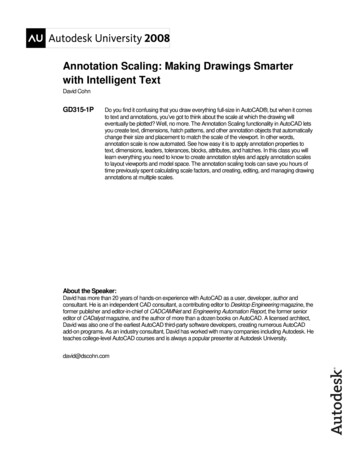



![March 3rd, 2017 [Manage Archive in Microsoft Outlook 2016]](/img/34/archive-outlook-2016.jpg)

